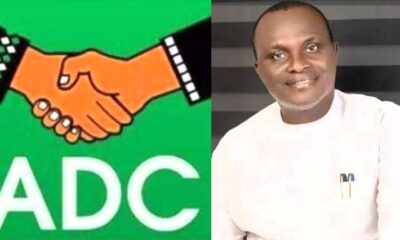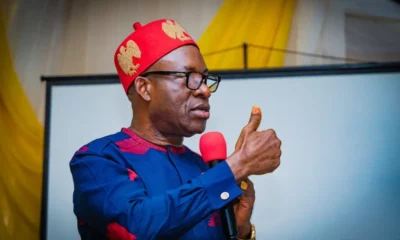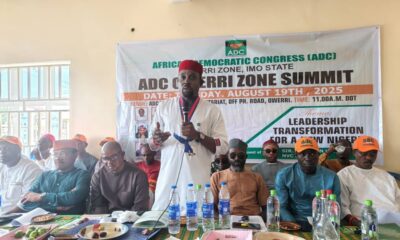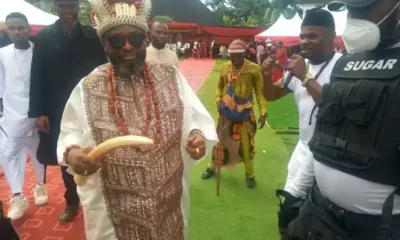Politics
REGIONALISM AND PARLIAMENTARY SYSTEM OF GOVERNMENT ARE NOT SOLUTIONS TO NIGERIA’S PROBLEM – EMIR OF KANO SANUSI
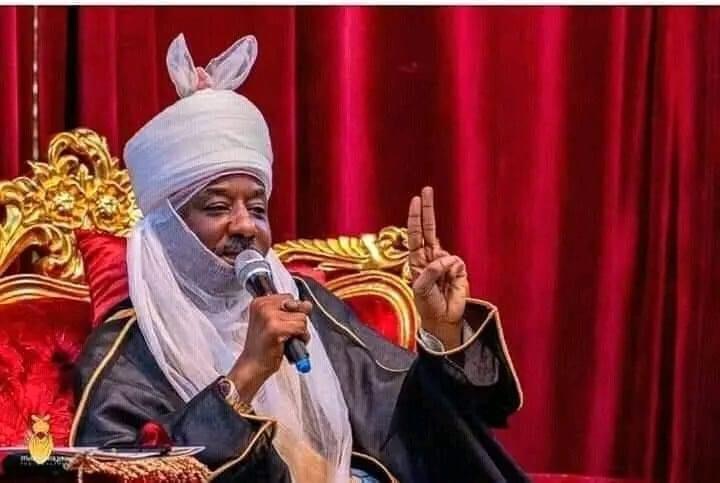
Emir of Kano, Muhammadu Sanusi II has said that regionalism and parliamentary system of government are not solutions to Nigeria’s problem.
Sanusi who said this in an interview with Vanguard, questioned the necessity of a bicameral legislature and the rationale behind appointing ministers from every state, even when not required. He noted that it contributes to bureaucratic inefficiencies and does not necessarily serve the best interests of the nation.
He also criticized the federal government’s interference in state matters, particularly regarding traditional and chieftaincy affairs. Emir Sanusi also stressed the importance of upholding constitutional principles and maintaining a clear separation of powers to ensure accountable governance.
The monarch who noted that regionalism will exacerbate the issues in the country rather than resolve existing tensions, also called for a more cohesive national identity and governance structure that promotes unity and accountability.
He said;
“I think there are several things we can do to address those structures because at the end of the day if you allow the state governors to run, the thing with devolution is we have 36 states, if only half of the governors are good, at least half of Nigeria has a good government. There is too much power at the centre, too much of the resources. The centre does not do primary education or primary healthcare, and that is where the vast majority of Nigerians are. Shouldn’t those resources come to the state? Instead of everybody going to Abuja, what is happening in Abuja? There are several issues that we need to look at. And also simple constitutionalism and federalism, just even the respect of separation of separation of power. If you take the example of what is happening in Kano today, chieftaincy matter is 100 per cent a state matter.
“We had a parliamentary system in the First Republic. What happened? At the end of the day, it is the humans that operate the system. People talk about regions. Initially, the regions we had in this country were North, East, and West, and then it became NorthEast and MidWest. Where did the creation called six geo-political zones come from historically? We can keep dividing and subdividing this country and thinking of ourselves, but are we really honest? Are these regions?
“If you go to the Niger Delta, since when did the Itsekiri stop fighting wars against the Ijaw? Since when did we become homogeneous?
“It was the Sokoto Jihad that brought us together. From the Sokoto caliphate, we became Northerners, from Northerners, we became Nigerians. When I was in King’s College, I grew up under Yakubu Gowon in a country where Nigerians were thinking like Nigerians. What happened? Political leadership is the one that exploits regional and ethnic identities as part of the struggle for political office.
“When they get there, they all sit together. If you look at the president’s cabinet, what do you have? You have everybody from every state. You have Christians, you have Muslims, you have Northerners and Southerners. Why are they not fighting one another in there? The elites are irresponsible.
“Don’t think that pandering to these elites by saying the solution is going to a regional system of government. How do we go regional? In Yorubaland, there are Ijebu, Ekiti, Ijesha, Owo, and Egba since when did they become one? Right there between Ife and Modakeke, they were killing each other. It is not about that. It is not a solution. How many parts are you going to slice this country to get a homogenous country? How? With all the intermarriages and education, I am not sure that is a solution, and I think people have this dream that can only be sold by blocking out history.
“We had a regional system in the First Republic. How did it end? We had a parliamentary system in the First Republic. How did it end? I am not talking about the coup; I am talking about the crisis that led to the coup. Before Nzeogu, forget Ironsi. How was the system before they came? Is there any documentary evidence that that system was fundamentally better than what we have?
“We can’t shift responsibilities away from human beings, the people who are responsible for operating the system. If you go to the Senate and the House of Representatives, and you are there for 16 years and you have never passed a bill, you don’t even know that your job is to be a lawmaker.”
Politics
National Leadership Sides with Prof. James Okoroma as Imo ADC Chairman

By Dan Opara
The lingering leadership tussle within the African Democratic Congress (ADC) in Imo State has taken a new twist, as Prof. James Okoroma has firmly dismissed allegations leveled against him by a section of party youths, insisting that he remains the authentic and duly recognized State Chairman of the party.
Reacting swiftly to a communiqué circulated by the aggrieved youths, Prof. Okoroma described their claims as “baseless, unfounded, and orchestrated to mislead the public.”
Speaking to ThePressman Newspaper via the telephone, he declared, “I am the authentic and duly recognized Imo State ADC Chairman. Those attempting to tarnish my reputation are nothing but drunkards who dwell in bar parlours to make noise. The said Emmanuel Amushie is an impostor.”
Prof. Okoroma further stressed that his leadership remains intact, legitimate, and anchored on due process.
He dismissed insinuations of impersonation, describing them as the handiwork of desperate political actors bent on destabilizing the party for selfish gains.
He urged ADC members in Imo State and across Nigeria to disregard the communiqué issued by the so-called youths, whom he labeled as “charlatans lacking the capacity to determine the direction of the party.”
According to him, his priority is to consolidate the ADC as a credible, transparent, and people-oriented platform that will offer Nigerians genuine democratic alternatives ahead of the 2027 elections.
Calling on security agencies and the Independent National Electoral Commission (INEC) to remain vigilant, he cautioned against impostors parading themselves as party executives.
Prof. Okoroma assured party loyalists that no amount of blackmail or propaganda would derail his mission.
He concluded with a rallying call, “Remain calm, remain focused, and disregard every falsehood. Together, we shall make ADC the pride of Imo State and Nigeria at large.”
Meanwhile, the national leadership of the ADC has officially weighed in on the matter. In a press statement made available to ThePressman Newspaper and signed by Sir Bon Unachukwu, National Vice Chairman (Southeast), on Saturday, August 22, 2025, the party categorically reaffirmed Prof. Okoroma as the authentic Imo State Chairman.
The statement, with reference number ADC/NVC-SE/PR/0825/01, read in part:
“The attention of the national leadership of the ADC has been drawn to reports that one Emmanuel Amushie has been parading himself as the Imo State Chairman of our party.
For the avoidance of doubt, Prof. James Okoroma remains the authentic Chairman of the Imo State Chapter, whose nomination was duly ratified by our National Executive Committee (NEC) and communicated to INEC.
The general public is hereby advised to disregard all claims to the Imo ADC chairmanship by Amushie, as such claims are false, misleading, and unconstitutional.
We call on security agencies to remain vigilant and forestall the disruptive activities of Amushie, which are capable of breaching public peace in the state.”
The press release, dated August 22, 2025, further warned that any attempt to destabilize the party through fraudulent claims would be met with decisive resistance.
With this development, the leadership of the ADC at both the state and national levels appears firmly aligned with Prof. Okoroma, leaving Chief Emmanuel Amushie’s claim increasingly weakened and discredited.
Politics
Peter Obi: ‘They came with sweetener’ – Soludo defends ‘psychiatric evaluation’ comment

Anambra State Governor, Charles Soludo, has defended his remark that any politician who promises to serve only one term in office requires psychiatric evaluation.
Speaking on Wednesday while fielding questions on Arise Television’s Prime Time programme, Soludo said his comment was made in the context of ongoing debates on zoning in Anambra politics.
He noted that similar promises had been made in the past but were quickly rejected by the electorate.
According to him, politicians often attempt to lure voters with pledges of serving only a single term, even when their manifestos suggest otherwise.
“You see, I said that in the context of the debate going on in my state, in a context where you have established a process of zoning, and somebody wants to cut short that particular zoning. They come with this sweetener, ‘oh if you give me this and then I will only spend this time.’ They know they were being disingenuous.
“They came with that argument in 2017 when my predecessor was running for a second time. They came here and telling Anambra, or some people promising us, including some people on the terrain today, Anambra people were quick to see through the disingenuity of that kind of promise, and of course, voted massively. The fact is that we won 21 over 21 local governments in that election. Nobody bought that crap, as it were.
“And now again, we are in for another election, and some people are again, imagine in the same state I am from the south and the north just finished, handed over to the south, and the south will serve its time, and then it will go to central. And now some people from the South senatorial zone are showing up because they realize that it does just…’oh, don’t worry if you vote for me’… So they are swimming against the tide. ‘If you vote for me, I will spend only one term’.
“Meanwhile, you see the manifesto that they are rolling out. You realize that even if they were to spend even 20 years, they wouldn’t even scratch it. I mean, it’s just, I don’t know how to describe it. So you’re just taking the people to be…you’re just playing at the people’s intelligence. You just think everybody is a fool.
“If anybody’s saying that it’s either he is just being deliberately deceitful or there is probably something not working right upstairs to take the entire people of Anambra State as fools, you know, to think that the entire people are fools, not to see through the lie, not to see through the deception, then the person must have a mental issue,” Soludo said.
The governor maintained that such promises insult the intelligence of the people, arguing that anyone making them is either being deceitful or unfit to hold office.
Ekwutosblog reports that the governor’s comments followed a recent pledge by former Labour Party presidential candidate, Peter Obi, that he would serve only one term if elected president in 2027.
Politics
ADC Owerri Zonal Summit Concludes with Resounding Success
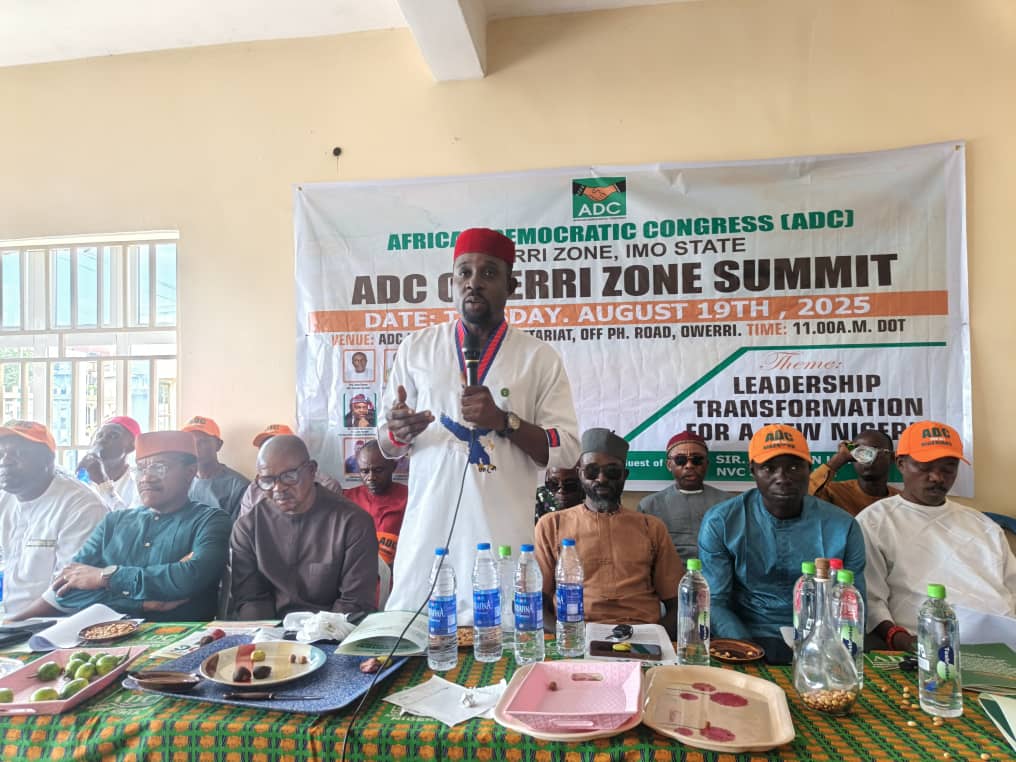
The ADC Owerri Zonal Summit, held on August 19, 2025, at the State Party Office in Port Harcourt Road, was a huge success. Dignitaries from across the zone, including 9 LGA Chairmen, attended the event.
Keynote speaker Dr. Okadigbo Odoghara delivered a compelling speech on leadership transformation in Nigeria. Other notable speakers included Barr. Eze Eluchie, who provided insightful political analysis, and Hon. Chinonso UBA (Nonsonkwa), a renowned Imo State journalist and ADC leader, who shared his thoughts on the way forward for Imo State ADC.
Representing State Chairman Prof. James Okoroma, Deputy Chairman Hon. Chima Amadi contributed to the event’s political growth with a thorough analysis of Imo State’s democratic landscape.
The summit showcased solidarity and unity within the party, with a large turnout of members and guests. Zonal Chairman Andyson Obani outlined the party’s next steps in addressing societal challenges and building a better Nigeria. Which he pointed out that “
ADC is now the Ladder and the most formidable united opposition force driven by the wisdom of Elders and Strength of the youths.
As a zone
1) We assure Coalition partners a better partnership with respect and mutual understanding.
2) We Request other leaders on owerri zone to join hands with ADC to ensure that our zone produces the next governor of imo state.
3) We will procure the ADC nomination form freely for the best aspirant in our zone to lead the rest.
4) We advice our Adc-Dna leaders to allign with party directives and avoid acts that will derail our noble objectives.
5) We will democratically engage our federal and state legislatures on effective utilization and accountability to owerri zone allocations.
6) We will unveil ADC football Tournament in September aimed at Talent hunt and formation of Adc Fc that will compete in Nigeria leagues. Our diaspora partners are getting ready.
7) We pledge our loyalty to National Leadership of the party led by Dist Sen David Mark, South East Zone led by Sir Bon Unachukwu and Imo State led by Prof James Okoroma.
8) Advice our ward and chapter leaders to live up to expectations.
Great Thanks to Dr Ralph’s Okey Nwosu (Ikolo Awka) and Hichief Anayo Arinze (Eko Awka) for been pragmatic leaders of high excellence.”
The event marked a significant milestone for ADC Owerri Zone, demonstrating its commitment to transformative leadership and inclusive growth.
-

 Politics10 months ago
Politics10 months agoMexico’s new president causes concern just weeks before the US elections
-
Business10 months ago
US court acquits Air Peace boss, slams Mayfield $4000 fine
-

 Trending10 months ago
Trending10 months agoNYA demands release of ‘abducted’ Imo chairman, preaches good governance
-
Entertainment10 months ago
Bobrisky falls ill in police custody, rushed to hospital
-
Entertainment10 months ago
Bobrisky transferred from Immigration to FCID, spends night behind bars
-

 Politics10 months ago
Politics10 months agoRussia bans imports of agro-products from Kazakhstan after refusal to join BRICS
-

 Politics10 months ago
Politics10 months agoPutin invites 20 world leaders
-
Education12 months ago
GOVERNOR FUBARA APPOINTS COUNCIL MEMBERS FOR KEN SARO-WIWA POLYTECHNIC BORI

